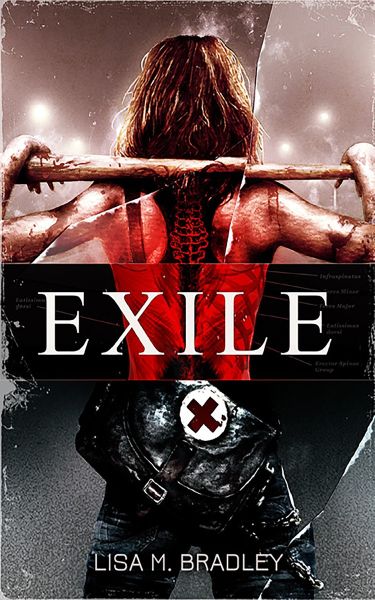Family Circle
Exile
By Lisa M. Bradley

24 May, 2019
Lisa M. Bradley’s 2019 debut novel Exile is a standalone near-future novel.
Leaking chemicals have affected the inhabitants of a previously unremarkable Texan town. Impulse controls have been shredded; psychosis and violence are rampant. The federal government’s response? Quarantine the community (now renamed Exile) and supply necessities. Exiles can only leave town if they can demonstrate that they are 4‑S: strong, smart, sane, and sterile.
Protagonist Heidi Palermo is determined to leave. She’s 3‑S: strong, smart, and sterile. As for sanity … compared to the rest of her family she’s sane. That’s not sane enough for the government.
The Palermo family is a matriarchy ruled by Heidi’s deranged mother. Mom is confined to her home by a high-tech ankle monitor, but still manages to control her husband and kids. Anger, threats, destruction of their possessions, murder. It’s a grim life. It’s grimmer for Heidi because her brother William is abusing her.
William is killed in battle by an Outsider named Tank. What’s an Outsider? Someone who is willing to move into Exile for five years. It’s a risky move (Exiles can kill without fear of retribution) but it is a job. Outsiders provide skills that keep Exile functioning.
Heidi thinks Tank is sexy. He may also be her ticket out of Exile, Perhaps when he leaves, he’ll have enough pull to take her too.
That doesn’t sit well with Mom. Heidi is supposed to obey her mother’s whims, not sleep with the enemy. Heidi, Tank, and Tank’s friends take refuge in a barricaded compound, where they are besieged by the Palermos and their allies. Supplies are running out.
Not only that. The saner people in the town suspect that government patience is running thin. It’s costs a lot to support the deranged folk of Exile. The government may be considering a more final solution. That clock is running out too.
~oOo~
I was reminded of Heinlein’s no doubt obscure 1940 short story “Coventry,” in that there’s a town essentially outside US law whose inhabitants cannot for the most part leave, but to which people can move if they like. Of course, it’s a bad idea to move there; inhabitant life expectancy is rather low.
We’re told that the quarantine of Exile has been maintained for twenty years; That may seem unlikely1, but … consider that the Guantanamo Bay detention camp is now seventeen years old and shows no signs of going away any time soon.
No, that wasn’t the aspect of the setting that bothered me. It’s that the quarantine is weirdly humane. Many Exiles are uncontrollably violent, which is just the sort of thing that always seems to justify heavy-handed response from police and government. Containment (by a fortified border that executes would-be escapees) is otherwise unexpectedly considerate. Moreover, the government supports the folks in quarantine. Fairly generously. Whereas it doesn’t seem to care all that much about the poor folk in thousands of other disadvantaged communities (such as Flint or California’s Central Valley, where the water isn’t fit to drink).
Perhaps Exile serves some useful purpose. Research? Spike enemy reservoirs with whatever was spilled on Exile? Heidi would of course have no idea, being trapped within the town.
Readers from dysfunctional families may find Heidi a sympathetic figure. She’s the scapegoat in her family; she is abused. Any, um, behavioral excesses on her part may be due to either childhood chemical exposure or her human environment, Or both. In any case, Heidi’s choices go some distance to explaining why she has trouble convincing people she has all four S’s. She may be a sympathetic figure but she’s certainly not a role model.
On the other hand, survivors of such abuse may find the book triggering. The same goes for people with low tolerance for violence.
If you like family dysfunction, paranoia, and urban warfare this may be the book for you.
Exile is available here (Amazon), here (Amazon.ca) and here (Chapters-Indigo).
1: I have no idea why the population has not dwindled or collapsed.
